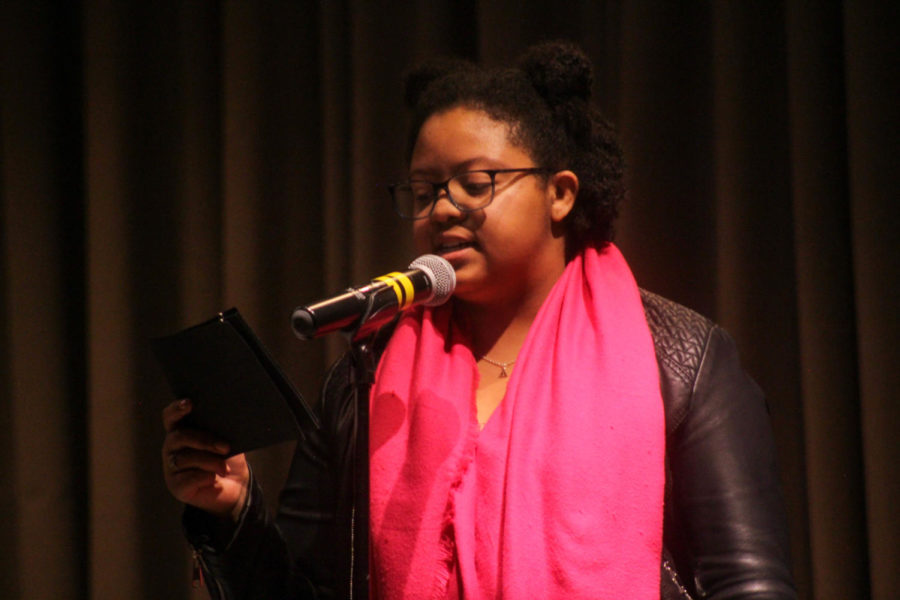‘The Vagina Monologues’ to kick off on Valentine’s Day
Student Breayona Reed performing the spoken poem, “My Angry Vagina,” during the Vagina Monologues on Feb. 15 at the Memorial Union.
February 13, 2019
This Valentine’s Day “The Vagina Monologues” will discuss consensual and non-consensual sexual experiences surrounding the vagina.
Iowa State will present “The Vagina Monologues” from 7 to 8:30 p.m. Thursday and from 6-7:30 p.m. and 9-10:30 p.m. Friday in the Sun Room of the Memorial Union.
The monologues cover topics such as body image, genital mutilation and reproduction. This is done through personal monologues performed by women of various ages, races and sexualities.
The Margaret Sloss Center for Women and Gender Equity, Student Union Board and the Society for the Advancement of Gender Equity host “The Vagina Monologues.” All of the benefits go to the Assault Care Center Extending Shelter and Support.
“The Vagina Monologues” were brought to Iowa State in 2001 by Alissa Stoehr, a student at the time and now a lecturer in the women’s and gender studies department.
The monologues were first written in 1995 from interviews done by Eve Ensler with more than 200 women. The interviews began as conversations with her friends and they would recommend her to other women.
Ensler performed every monologue herself in the beginning, with following performances featuring three other actresses.
Since it opened on Oct. 3, 1996 at the HERE Arts Center in New York City , the performance has been ever-changing. In 2004, the first all-transgender performance premiered.
Some of the monologues include, “I Was Twelve,” “My Mother Slapped Me” and “My Angry Vagina,” a piece about young women and girls’ first menstrual period.
Another monologue was “The Women Who Loved to Make Vaginas Happy,” about a sex worker who discusses the details of her career and her love for giving women pleasure.
After gaining momentum, “The Vagina Monologues” sparked the V-Day movement. The V-Day movement is a global activist movement to end violence against women and girls. It is described as a “catalyst that promotes creative events to increase awareness, raise money and revitalize the spirit of existing anti-violence organizations.”
Colleges were then encouraged to perform “The Vagina Monologues” on or near Valentine’s Day to raise money and to help make violence against women visible.
Over the years, “The Vagina Monologues” has received criticism from feminists and social conservatives for being anti-transgender and colonial.
A feminist, Betty Dodson, criticized the play for the lack of the term “clitoris” throughout the play. She believes the play sends messages that the vagina is the main sex organ, not the clitoris. Members of the transgender community have also criticized it for being insufficiently inclusive of transgender people.
The Margaret Sloss Center for Women and Gender Equity posted a response to the critiques. In this response they state “we also encourage you to critically reflect and think about the issues raised in ‘The Vagina Monologues’ production, the voices heard and the voices not heard in Eve Ensler’s script.”
The Sloss Center explained one of the conditions of getting the rights to the play is that you cannot alter it.
Critiques the monologues have received in the past include the representation of prostitution in “The Women Who Loved to Make Vaginas Happy” as a pleasurable experience, the stereotyping of particular identity groups by their “moans” and the issue of inclusivity to women who do not have vaginas.
Eve Ensler wrote an op-ed in Time responding to some of the criticism.
“The Vagina Monologues never intended to be a play about what it means to be a woman. It is and always has been a play about what it means to have a vagina. In the play, I never defined a woman as a person with a vagina,” Ensler said.







